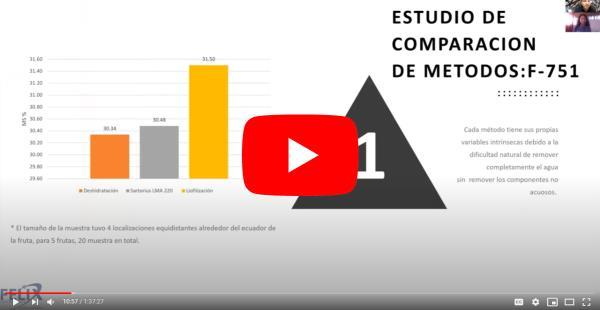Felix Instruments held its 1st webinar in Spanish on F-751 quality measuring devices for avocado, kiwi and mango
All countries
Monday 25 May 2020
Felix intruments
On May 14, 2020, Ivonne Chica, responsible for customer relations, and Eric Muñoz García, from the scientific team at Felix Instruments, showed how this spectrometer which non-destructively measures product maturity can work for producers, packers and distributors. They were joined by Luis Medina, special guest from DEL MONTE, to discuss their user's experience. Among the information discussed, we can cite: an overview of the instrument, best practices for using the instrument, the user experience with Luis Medina and the explanation of the case studies.
Ivonne said the Quality Meters F-751 were born from a parent instrument, the F-750 Product Quality Meter, which uses near infrared spectroscopy (NIR), developed at the University of Central Queensland, to estimate parameters such as dry matter, total soluble solids (TSS or brix), titratable acidity and color. Operating as a high-powered flashlight, the F-750 and F-751 send light particles into a product, then measure the interaction of NIR light with the molecular components of the product to quantify the characteristics chosen by the product. 'user; this equipment, unlike the F-751, allows the creation of new models. The F-750 currently has initial models for apples, grapes, mandarins, mangoes, pears, persimmons, avocados, etc.
Regarding F-751 quality meters (from a single product), it has been explained that these are portable devices that were born in response to an industry need to measure key factors quickly and non-destructively. the maturity of a single fruit. Among the equipment available on the market are the F-751 Avocado, the F-751 Mango and the F-751 Kiwi.
The 3 devices share several common characteristics, among the most important: they improve the crop monitoring method by providing precise data and date forecasts. They reduce the amount of product waste because it is a non-destructive measurement method. They reduce the time it takes to process the product, which increases the efficiency of the supply chain.
In addition, they are ready to use once out of the box. The simple and intuitive user interface makes the device easy to use for everyone, and can be used in orchards or in quality control labs. The battery allows for more than 500 measurements.
It has an integrated GPS which makes it possible to follow the evolution of the fruits even from the tree. The Fruitmaps software which accompanies the equipment makes it possible to determine the evolution of the different plots.
The equipment developed is calibrated for use on Hass avocado, Hayward and Gold kiwifruit, Tommy K mangoes, Ataulfo, Kent, Calypso, Keitt and Honey Gold.
Emphasis was placed on assessing the maturity of the avocado on the basis of the dry matter, which is due to the positive correlation between the dry matter and the oil content of the avocado. The F-751Avo measures the interaction of light with molecular components in the near infrared (NIR) spectrum (Hass model 750-975nm). The spectra obtained from the measurement of the sample are referenced with the integrated model and the resulting dry matter value is displayed on the screen, all in 30 seconds and in a non-destructive manner.
Eric, showed and explained case studies including validation of data on kiwis, comparison studies of methods based on data collected by Dr Jorge Osuna of INIFAP in 3 different regions of Mexico; then Luis Medina, head of the quality department at DEL MONTE, shared data from measurements made in his establishment using the traditional method compared to the F-751 Avo. Some of the main sources of variance in the measurement of avocado and dry matter were also discussed and best practices for safer scans were shared. Finally, the webinar ended with a long series of questions and answers.
Luis Medina Guzman
Director of the quality department of Del Monte Fresh Produce, Mexico. Biochemical engineer with more than 12 years of professional experience in the food industry with a comprehensive knowledge of fresh products, packaging, drinks, fats and oils, FIBC and retail.
About Felix Instruments:
Born from plant research and physiology, Felix Instruments - Applied Food Science was founded in 2012 as a subsidiary of CID Bio-Science Inc. which has been designing instruments for research on plants and the environment for more than 25 years. Put
If you missed this webinar, you can still access it on: https://felixinstruments.com/blog/poder-del-laboratorio-en-la-palma-de-tu-mano/
If you would like a quote, you can do so on:
https://tinyurl.com/f-751-felix">https://tinyurl.com/f-751-felix





